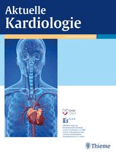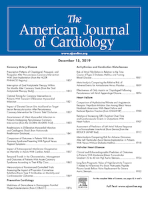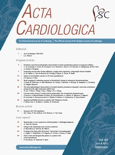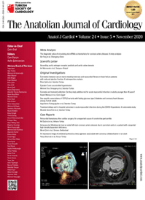
Minerva Cardiology and Angiology
Scope & Guideline
Pioneering insights in cardiovascular medicine.
Introduction
Aims and Scopes
- Cardiovascular Disease Management:
Research addressing the prevention, diagnosis, and treatment of cardiovascular diseases, including acute coronary syndromes, heart failure, and arrhythmias. - Innovative Therapeutic Approaches:
Exploration of new therapeutic strategies, including the use of novel drug therapies, interventional techniques, and advancements in surgical procedures. - Cardiovascular Imaging and Diagnostics:
Studies focusing on advanced imaging techniques, such as echocardiography, cardiac MRI, and computed tomography, to improve diagnostic accuracy and patient outcomes. - Public Health and Epidemiology:
Research examining the epidemiology of cardiovascular diseases, risk factors, and the impact of socioeconomic factors on cardiovascular health. - Emerging Technologies in Cardiology:
Investigations into the application of technologies such as artificial intelligence, machine learning, and telemedicine in the field of cardiology. - Chronic Conditions and Comorbidities:
Studies exploring the relationship between cardiovascular diseases and chronic conditions, such as diabetes, chronic kidney disease, and hypertension.
Trending and Emerging
- Integration of Artificial Intelligence and Machine Learning:
There is a growing interest in the application of AI and machine learning techniques for predictive analytics, risk stratification, and personalized medicine in cardiology. - Impact of COVID-19 on Cardiovascular Health:
Research exploring the long-term cardiovascular implications of COVID-19, including effects on myocardial injury and the management of patients with pre-existing cardiovascular conditions, is increasingly prevalent. - Patient-Centered and Socioeconomic Studies:
Emerging research focuses on the social determinants of health and how socioeconomic factors influence cardiovascular outcomes and healthcare access. - Advancements in Non-Invasive Cardiovascular Diagnostics:
There is a rising trend in studies that evaluate new non-invasive diagnostic tools and methods, reflecting a shift towards improving patient comfort and access to care. - Interventional Innovations:
Research on novel interventional techniques and devices, including bioresorbable stents and innovative catheter-based therapies, is gaining traction, indicating a focus on technological advancements in treatment.
Declining or Waning
- Traditional Risk Factor Studies:
Research focused solely on traditional cardiovascular risk factors (e.g., hypertension, hyperlipidemia) has seen a decreased emphasis as the field shifts towards more complex interactions and multifactorial approaches. - Basic Science Cardiovascular Research:
There appears to be a waning interest in purely basic science studies, as the journal increasingly prioritizes clinical applications and translational research. - Historical Reviews and Perspectives:
Papers that focus solely on historical analyses of cardiovascular practices and guidelines are less frequent, reflecting a shift towards contemporary and future-focused research. - Single-Center Studies:
The prevalence of single-center studies is declining, as the journal aims for broader, multicenter studies that provide more generalizable data. - Invasive Procedures without Technological Advances:
Research on traditional invasive procedures without accompanying technological advancements or innovations is becoming less prominent, as there is a greater focus on novel interventional strategies.
Similar Journals

Frontiers in Cardiovascular Medicine
Connecting Global Insights for Heart Health Advancement.Frontiers in Cardiovascular Medicine is a leading open-access journal published by FRONTIERS MEDIA SA, dedicated to advancing research in the field of cardiology and cardiovascular medicine. Since its inception in 2014, the journal has become a vital platform for the dissemination of high-quality research, boasting a commendable Q2 rank in the 2023 category for Cardiology and Cardiovascular Medicine. With a focus on promoting innovative studies and clinical insights, Frontiers in Cardiovascular Medicine facilitates open access to its content, allowing researchers, healthcare professionals, and students from around the globe to engage with the latest findings which are critical for the advancement of cardiovascular health. The journal's significant presence in the academic landscape, as indicated by its Scopus ranking (161/387 and 58th percentile), underscores its importance as a research outlet in this essential field. Located in Lausanne, Switzerland, the journal continues to support the global cardiovascular community by encouraging collaboration and knowledge sharing to address the challenges faced in cardiovascular medicine today.

Aktuelle Kardiologie
Exploring groundbreaking studies in cardiology.Aktuelle Kardiologie is a premier journal in the field of cardiology, published by GEORG THIEME VERLAG KG. With its ISSN 2193-5203 and E-ISSN 2193-5211, it serves as an essential resource for cardiologists, researchers, and healthcare professionals who seek to stay abreast of the latest developments in cardiovascular medicine. Although currently not open access, the journal provides comprehensive insights through its rigorous peer-review process, ensuring high-quality content for its readers. Located in Stuttgart, Germany, the journal’s objectives include fostering the exchange of innovative research, clinical findings, and expert opinions that can significantly enhance patient care and inspire further studies in cardiovascular health. In an era where cardiovascular diseases are a leading public health concern, Aktuelle Kardiologie remains a vital platform for disseminating critical knowledge and advancing the field.

Kardiologie
Exploring New Frontiers in Cardiovascular Medicine.Kardiologie is an emerging journal dedicated to advancing the field of cardiology and cardiovascular medicine, published by SPRINGER HEIDELBERG in Germany. Established with the first issue in 2022, this journal provides a valuable platform for the dissemination of innovative research, clinical studies, and review articles that contribute to both theoretical knowledge and practical applications in cardiology. While the journal currently holds a Q4 category ranking in the field and occupies a percentile of 24 according to Scopus, it aims to enhance its impact factor by attracting high-quality submissions from researchers and clinicians alike. Kardiologie is particularly focused on bridging the gap between cutting-edge research and clinical practice, ensuring that the latest scientific findings are readily accessible to practitioners. Though it operates under traditional access options at present, the journal aspires to broaden its accessibility and reach in future editions, making it a pertinent choice for anyone interested in the evolving landscape of cardiovascular health.

AMERICAN JOURNAL OF CARDIOLOGY
Leading the Charge in Cardiovascular Discovery and ExcellenceThe American Journal of Cardiology is a leading peer-reviewed journal in the field of Cardiology and Cardiovascular Medicine, published by Excerpta Medica Inc-Elsevier Science Inc. Since its inception in 1958, the journal has consistently contributed to the advancement of cardiovascular research, providing a platform for groundbreaking studies and clinical findings that shape modern medical practices. With an impressive impact factor placing it in the Q1 category in its field for 2023, it ranks among the top journals in medicine, with a rank of #155 out of 387 in the Scopus database, reflecting its significance and rigorous editorial standards. The journal is committed to disseminating high-quality research that fosters innovation and enhances clinical outcomes in cardiology. Although it does not provide Open Access options, the American Journal of Cardiology remains an essential resource for researchers, healthcare professionals, and students looking to deepen their understanding of cardiovascular health.

ACTA CARDIOLOGICA
Exploring the forefront of cardiac research.ACTA CARDIOLOGICA is a distinguished journal published by TAYLOR & FRANCIS LTD, focusing on the dynamic fields of Cardiology and Cardiovascular Medicine. Established in 1946, the journal has maintained a significant presence in the academic community, providing a platform for cutting-edge research and clinical studies that aim to address challenges in cardiovascular health. With its Q3 rating in both Cardiology and General Medicine categories, it showcases a robust compilation of articles that reflect the evolving landscape of cardiac care. Although ACTA CARDIOLOGICA is not an Open Access journal, it continues to serve a vital role for researchers, professionals, and students dedicated to advancing knowledge in cardiovascular health. This journal, with an ISSN of 0001-5385 and E-ISSN of 1784-973X, is a critical resource for those looking to stay updated on the latest developments and practices in the specialization, contributing significantly to the field until 2024 and beyond.

Anatolian Journal of Cardiology
Advancing Cardiac Research Through Open Access Excellence.The Anatolian Journal of Cardiology, published by KARE PUBL, stands as a vital resource in the field of Cardiology and Cardiovascular Medicine. With an ISSN of 2149-2263 and E-ISSN 2149-2271, this Open Access journal has been fostering the dissemination of critical research since 2001, ensuring that high-quality content is freely available to a global audience. Based in Turkey, the journal aims to bridge gaps in cardiological knowledge through rigorous peer-reviewed articles that span a wide range of topics, from innovative clinical practices to groundbreaking research findings. While its current ranking places it in the Q3 category of cardiology journals, the Anatolian Journal of Cardiology continues to strive towards enhancing its impact, currently holding a Scopus rank of 236 out of 387. Researchers, practitioners, and students alike will find this journal an essential platform for keeping abreast of the latest developments in cardiovascular health.

Nepalese Heart Journal
Exploring Innovations in Heart Disease ManagementNepalese Heart Journal, published by the CARDIAC SOC NEPAL, serves as a premier platform for disseminating knowledge in the field of cardiology and cardiovascular health. With an ISSN of 2091-2978, this journal aims to bridge the gap between researchers, clinicians, and academicians by presenting high-quality, peer-reviewed articles that address clinical practices, innovative research, and emerging trends in heart disease management, especially within the context of Nepal and the surrounding region. Although it operates under a traditional publishing model, its commitment to excellence aids in reinforcing the scientific discourse in an area critical to public health. The journal is a valuable resource for professionals and students alike who are focused on advancing their understanding of cardiology and its implications for health policy and practice. Exploring the intersections of local challenges and global advancements in heart health, the Nepalese Heart Journal is poised to contribute meaningfully to the evolving landscape of cardiovascular research.

Journal fur Kardiologie
Illuminating the Path of Cardiovascular Innovation.The Journal fur Kardiologie, published by KRAUSE & PACHERNEGG GMBH, is a pivotal resource in the field of Cardiology and Cardiovascular Medicine. With an ISSN of 1024-0098 and an E-ISSN of 1680-936X, this journal has played a significant role in disseminating valuable research and clinical studies from 1998 until its coverage discontinuation in Scopus in 2017. Despite its Scopus rank being relatively low at #316/324 in its category, it continues to serve as a platform for emerging cardiology research. The journal’s scope encompasses various aspects of cardiovascular health, providing insights that are crucial for researchers, professionals, and students alike seeking to advance their knowledge and practice in cardiology. While the journal is not open access, its contributions to the field are essential for those looking to stay informed about the latest developments in cardiovascular medicine.

CANADIAN JOURNAL OF CARDIOLOGY
Pioneering Research in Cardiology and Cardiovascular MedicineCanadian Journal of Cardiology (ISSN: 0828-282X, E-ISSN: 1916-7075), published by Elsevier Science Inc, serves as a vital platform for disseminating high-quality research in the dynamic field of cardiology and cardiovascular medicine. Since its inception in 1985, this journal has established itself as a leader in the field, currently holding a prestigious Q1 ranking in Cardiology, indicating its significant impact and contribution to medical science. With a Scopus rank of #50 out of 387 in its category and placing in the 87th percentile, the journal showcases rigorous peer-reviewed articles that advance knowledge and practice in cardiology. Although the journal is not open access, it provides valuable insights and research findings that cater to clinicians, researchers, and students who are committed to improving cardiovascular health. As we approach the convergence of years to 2024, the Canadian Journal of Cardiology continues to strive for excellence, facilitating a discourse vital for both academic and clinical advancements in cardiology.

Journal of Cardiovascular Development and Disease
Exploring the frontiers of cardiac development and disease.Journal of Cardiovascular Development and Disease, an esteemed publication by MDPI, has been a dedicated platform for disseminating cutting-edge research since its inception in 2014. Based in Switzerland, this Open Access journal not only provides unrestricted access to its content but also fosters global collaboration among scholars focusing on cardiovascular health and disease development. With an impressive focus classified as Q1 in Pharmacology, Toxicology and Pharmaceutics for 2023, it attracts a diverse range of interdisciplinary research, supporting advancements in pharmacological applications relevant to cardiac conditions. The journal's ongoing convergence through 2024 highlights its commitment to the evolving landscape of cardiovascular research, making it a vital resource for researchers, professionals, and students alike who are keen to contribute to and learn from significant developments in this critical field.